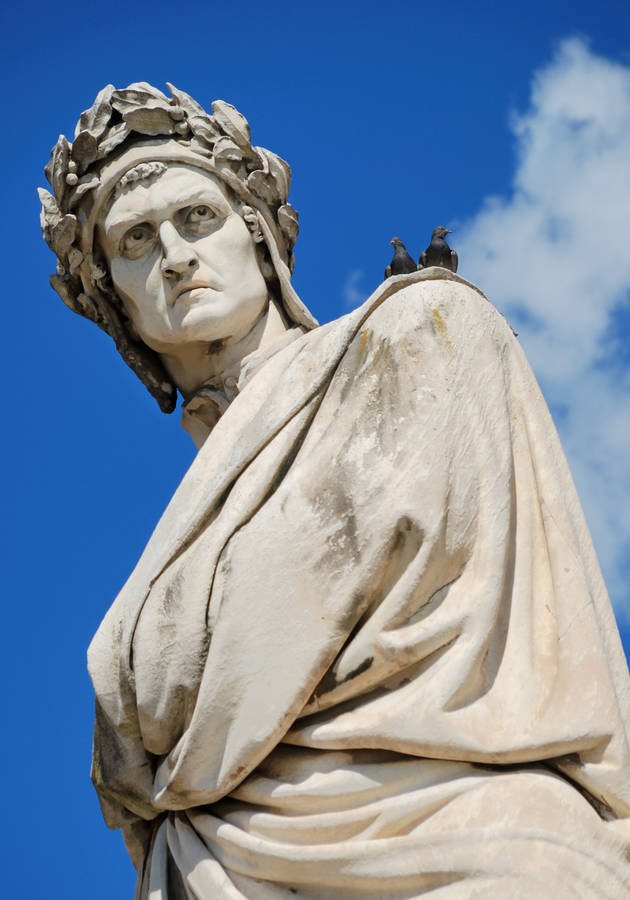Considered the finest Italian poet in history, Dante Alighieri is routinely celebrated as one of the defining influences on modern western European culture. He made lasting contributions to at least five different areas of human endeavor – all of which are profoundly affected by his ideas and writings to this day.
Prologue: Florence, “where civil blood makes civil hands unclean”
Before it became the birthplace of the Renaissance, Florence was a city of chivalric elites and public disorder, a town divided between several households alike in dignity, but different in heart and mind. Some of them, mostly wealthy mercantile families, favored the papacy; they called themselves the Guelphs. In contrast, the predominantly agrarian Ghibellines supported the Holy Roman Emperor and advocated for a separation between church and state.
Who knows if this ancient grudge would have broken to new mutiny if it wasn’t for love and a passionate Florentine Guelph by the name of Buondelmonte de’ Buondelmonti! In the beginning of 1215, at a public engagement ceremony, he disrespectfully rode past his agreed-upon fiancée and her family – the powerful Ghibelline Amidei clan – and asked for the hand of a blushing fair-haired girl from the rivaling Donati household.
Humiliated, the Amidei immediately started plotting revenge. When they couldn’t decide on the type of punishment, Mosca dei Lamberti – whose family was allied to the Amidei – uttered the now-famous words: “Cosa fatta capo ha,” meaning “What’s done is done” – or, more literally – “All things should have a conclusion.” Buondelmonte should be killed, Mosca meant, because even a milder form of revenge (a simple beating, for example) would incur as much hatred as the most severe form (murder).
On Easter Sunday of that same year, on his way to marry the Donati girl, Buondelmonte was ambushed by the Amidei and their allies, dragged from his horse and stabbed to death next to the statue of Mars at the head of the Ponte Vecchio – the very place where he had rejected his betrothed a few months before. The old chroniclers see this murder as the origin of the city's division between Guelph and Ghibelline factions, the “beginning of its destruction.” The dynamics of this enmity would define the political life in Florence for the next two centuries. It would also define the life of Dante.
Poetry: “they welcomed me as one of their own group”
Dante Alighieri, the greatest poet of the Italian language, was born half a century after the murder of Buondelmonte, sometime between May 11 and June 11, 1265. His mother, Donna Bella, died during childbirth. His father, Alighiero di Bellincione d'Alighiero, was a member of the Guelphs, but was politically of such a low standing that he seems to have suffered no reprisals even after the Sienese-Ghibelline army routed the then-predominantly Guelphian Florence at the Battle of Montaperti, five years before Dante’s birth. His son would not be as fortunate: because of his political affiliations, Dante would be driven into exile in 1302, at the age of 37. Florence’s greatest son would have to spend the last two decades of his life far away from the town he would make famous for eternity.
Not much is known about Dante’s youth. It is likely that he received a standard Latin education. It is also known, from his own testimony, that to perfect his literary style, he studied with Brunetto Latini – the most renowned Florentine poet, philosopher, and politician of the previous generation. At the age of 18, stirred by a horrific, lovelorn dream vision, Dante wrote one of his first sonnets, which he then sent to the most famous poets of his day to prove that he had mastered the art of writing poetry. The sonnet was answered by many, but the most important response came, in the form of a sonnet, from a distinguished 33-year-old troubadour by the name of Guido Cavalcanti. The exchange would mark the beginning of the pair’s lifelong – and politically tumultuous – friendship.
It would also mark Dante’s introduction to the “dolce stil novo,” Italian for “sweet new style,” the most important literary movement of the 13th century. Inspired by the verses of Bologna-born poet Guido Guinizelli, Dante, Cavalcanti, and a few other Tuscan stilnovisti would pioneer a revolutionary shift in literature, turning away from the tentatively erotic and thoroughly selfish love of past times to discover and portray the beauty of loving generously and purely. With the stilnovisti, the image of the angelic beloved and the pain of the gentle heart that adores her would become legitimate poetic subjects for the first time in literary history. Ancient Greek poets may have invented love – but Dante and his troubadour peers refined it.
Language: “It was my intention from the beginning to write in the vernacular”
As groundbreaking as the stylistic experiments of the stilnovisti were, their main contribution to the history of great ideas was, arguably, political. Namely, by championing the use of the Tuscan vernacular language over Latin in literature, they changed the linguistic history of their still nonexistent country and utterly transformed the social landscape of humanity.
Largely because of Dante’s decision to write his works in his native tongue rather than in Latin, the Tuscan dialect became the Italian language, and the Italian language became the “lingua franca” of late medieval Europe. In the centuries after Dante’s death, poets all over Europe followed suit, and, by the time Gutenberg invented the printing press, the ideas of the foremost European minds had already started circulating among the masses, heralding the advent of democracy, egalitarianism, and economic progress.
Dante didn’t only write in Tuscan – he also composed two important treatises defending his use of the vernacular and advocating for an Italian literary language. Both were written sometime between 1304 and 1307 – and both left unfinished. “The Banquet” (“Il Convivio”) is a sort of encyclopedia of everything known at the time, widely described as the first great example of a treatise in vernacular prose. Its companion piece, “On the Eloquence of the Vernacular” (“De Vulgari Eloquentia”), was written in Latin and contains the first theoretical discussion of a unifying Italian literary language, “il volgare illustre.”
In 1319, Bolognese poet and grammarian Giovanni del Virgilio composed an eclogue reproaching Dante – by then already famous across the Italian peninsula – for wanting to achieve poetic glory with his “Comedy” – a work written in the vernacular – and urging him to devote himself to writing an epic in Latin. Dante responded with an allegorical eclogue of himself, in which he confidently and prophetically suggested that he wouldn’t only earn a laurel with his Tuscan works, but would also pave the way for others to do the same in the future.
Politics: “so vilely punished in the eternal exile”
Dante’s literary interests did not isolate him from the political turmoil of his times. On the contrary – he was a fervent believer in the Aristotelian assumption that man is primarily a political being. In 1289, at the age of 24, he fought with the pro-papal Guelph cavalry at Campaldino against Ghibelline forces from Arezzo. Resoundingly victorious, the Guelphs secured dominance in Florence after the battle, but almost immediately began infighting, eventually dividing into two factions. The Blacks remained uncritically supportive of Pope Boniface VIII, while the Whites started publicly disagreeing with some of his policies. Dante aligned himself with the latter.
In 1295, in an attempt to secure a public office in Florence, he joined the guild of physicians and pharmacists (to which philosophers could also belong). A year later, he participated in a citizens’ government known as the Council of the Hundred. And, in 1300, he was elected to one of six offices of prior, or president, of the Florentine guilds. In one of his first decisions as a prior, just nine days after being elected, he was forced to authorize the exile of his “primo amico” (best friend), Guido Cavalcanti, who died soon after from malarial fever, far away from home.
In October 1301, Dante was part of a delegation sent from Florence to Pope Boniface VIII to discuss the future of the divided city. He was unwilling to go – but was just as reluctant to allow someone else to take his place. On the occasion of the debate, he expressed his reservations in a now-legendary manner: “If I go, who remains; and if I remain, who goes?” Dante was right to have these doubts. The delegation turned out to be just an excuse to get him out of Florence. In his absence, the Blacks gained control of the city and started banishing the Whites. The great poet found out about the subterfuge while journeying toward Rome. On January 27, 1302, he learned that he had been sentenced to fine and exile. Just a month and a half later, after refusing to pay the fine, he was sentenced to death – if he ever returned to Florence. Despite various attempts to regain admission to Florence, he was never to enter his native city again.
Dante took refuge first in Verona, wandered from place to place – as far as Paris and maybe even Oxford – and finally settled in Ravenna. In exile, Dante, once a Guelph moderate, would become one of the most fervently outspoken defenders of the position that the empire does not derive its political authority from the pope. Ironically, he would also become close to a few renowned Ghibelline families – his former enemies – and spend the rest of his life at their palaces, learning “how salty is the taste of others’ bread, and how hard the road that takes one down and up the stairs of others’ homes.”
Love: “from that time on, Love governed my soul”
In 1274, when Dante was 9 years old, his father took him to a May Day celebration at the house of Florentine noble Folco Portinari. There, for the first time in his life, he met Folco’s daughter, Beatrice, a girl just a few months younger than him. “At that very moment,” he remembers in “La vita nuova,” his first major work, “the vital spirit, the one that dwells in the most secret chamber of the heart, began to tremble so violently that even the most minute veins of my body were strangely affected; and trembling, it spoke these words: ‘Here is a god stronger than I who comes to rule over me.’”
Written in the Tuscan dialect between 1283 and 1293, “La vita nuova” – or “The New Life” – is a rare and fairly original literary piece called prosimetrum, a collection of poems linked by prose commentary. It is also one of the first intimate autobiographical works of modern history. In it, Dante describes his unrequited love for Beatrice, whom he would see just one more time before her untimely death at the age of 24, on June 8, 1290.
The event would shatter Dante’s world. Critics say that, in a way, the remainder of his life would be devoted to finding the “tongue” to describe both the impact Beatrice had on his life and the state of his soul after she died. Although “La vita nuova” ends on a note of failure – because it closes with Dante’s decision to stop writing for Beatrice until he is capable of putting into words “that which has never been written of any other woman” – he would ultimately find the language worthy of his subject in his greatest poetic achievement, “The Divine Comedy.”
Ethics: “O race of men, born to fly heavenward, how can a breath of wind make you fall back?”
Just like the rest of the stilnovisti, from early on in his life, Dante was interested in the ways love affects the human mind and intellect. However, unlike Guinizelli and Cavalcanti – and especially after Beatrice’s death – Dante couldn’t think of love as an illness with recognizable symptoms, but, following Plato, he saw it as a majestic encounter with the divine, our only opportunity to experience heaven on Earth.
This revolutionary idea is treated at some length in Dante’s masterpiece “The Divine Comedy,” a long narrative poem in terza rima (a specific rhyming pattern) written in exile over a dozen years, between 1308 and 1320. Widely considered one of the greatest works of world literature, the poem depicts the allegorical journey of Dante, the poet-pilgrim, through Hell, Purgatory, and Paradise – the three worlds of the afterlife. Three guides accompany him on this voyage. First, the Roman poet Virgil, representing reason, leads him through Hell and half of Purgatory. Then, his idealized beloved, Beatrice, escorts him from thereon to the topmost sphere of heaven, the Empyrean, where she hands him over to Saint Bernard of Clairvaux, who represents contemplative mysticism and devotion to Mary. The message is rather simple: only our reason can guide us away from sin and wickedness in this life and help us experience true love, which, in turn, is our only means to reach purity and, ultimately, God.
Written with the purpose of saving all mankind, “The Divine Comedy” represents not only Dante’s attempt to communicate with the otherworldly (Beatrice and God) but also his ethical understanding of human life in its entirety – depicting how one wins reward or punishment in the afterlife while still living in this life, by exercising free will to do good or evil. It is difficult to overestimate its scope and influence. And even more difficult to hypothesize how different our world would have looked like had this poem never been written.
Epilogue: “Now let us honor the most illustrious poet”
Dante died just one year after completing “The Divine Comedy,” on September 14, 1321, in Ravenna. His body remains there to this day, far away from his birthplace. An empty tomb in Florence was built five centuries afterward to symbolize the city’s lasting remorse for exiling Dante. Its front is adorned with a verse taken from “The Divine Comedy”: “Onorate l’altissimo poeta, ‘now let us honor the most illustrious poet.’” The accompanying verse – “his shade that left is now returned to us” – is poignantly omitted.
But then again, it’s difficult to say that Dante ever left Florence, Ravenna, or our world altogether. He lives to this day in the Italian language, often called “the language of Dante.” He also lives in our idea of what love is and how it can transform us. He lives, finally, in our morals: even those who have never heard of him owe many of their ideas about sins and the afterlife unknowingly, not to the Bible, but to the powerful vision of “The Divine Comedy” – perhaps the only literary masterpiece whose epithet, “the divine,” will never be questioned. The same holds for the epithet that often accompanies Dante’s name in Italy: “Il Sommo,” The Unsurpassed One.
Sources
Works by Dante
- Mark Musa, Dante’s Vita nuova: a translation and an essay (Indiana University Press, 1973).
- Dante, The Divine Comedy, Vol. I-III [translated by Mark Musa] (Penguin, 1984-1986).
- Robert M. Durling and Ronald L. Martinez, The Divine Comedy of Dante Alighieri, Vol. I: Inferno (Oxford University Press, 1996)
Main biographical
- Nick Havely, Dante (Wiley-Blackwell, 2007).
- Ricardo J. Quinones, “Dante,” Encyclopedia Britannica (December 26, 2019) [https://www.britannica.com/biography/Dante-Alighieri]
- “Dante Alighieri,” Gale Contextual Encyclopedia of Literature, Vol. 2 [eds. Anne Marie Hacht and Dwayne D. Hayes] (Gale, 2009), pp. 443-447.
- “Dante Alighieri,” Encyclopedia of World Writers, Vol 1 (Beginnings Through the 13th Century) [Thierry Boucquey, ed.] (Facts on File, 2005), pp. 83-85.
Other and contextual
- Francesco De Sanctis, De Sanctis on Dante (translated by Joseph Rossi and Alfred Galpin) (Madison: The University of Wisconsin Press, 1957).
- Harold Bloom, “Introduction,” Bloom’s Modern Critical Views: Dante Alighieri (Philadelphia: Chelsea House Publishers, 2004), pp. 1-10.
- R. W. B. Lewis, “Dante,” The New York Times (July 29, 2001) [https://www.nytimes.com/2001/07/29/books/chapters/dante.html]
- Aquilecchia, Giovanni et al. “Italian literature,” Encyclopedia Britannica (March 08, 2018) [https://www.britannica.com/art/Italian-literature]
- Sandra Alvarez & Peter W. Sposato, “Chivalry and Public Disorder in Thirteenth-Century Florence,” Medievalists.net [https://www.medievalists.net/2013/05/chivalry-and-public-disorder-in-thirteenth-century-florence/]





























